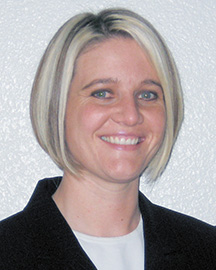Q&A

Inside The Futures World
Want to find out how the futures markets really work? DeCarley Trading senior
analyst and broker Carley Garner responds to your questions about today’s
futures markets. To submit a question, post your question at https://Message-Boards.Traders.com.
Answers will be posted there, and selected questions will appear in a future
issue of S&C. Visit Garner at www.DeCarleyTrading.com.
Her books Currency Trading In The Forex And Futures
Markets; Commodity Options; and A Trader’s
First Book On Commodities, are available from FT
Press.
TECHNOLOGY AND TRADING
Technological advances seem to have improved the trading environment tremendously in recent years. What are your thoughts?
Unfortunately, an improved trading environment hasn’t necessarily translated into more successful traders. Too many beginning traders fail to prepare for the challenges they will face before jumping into the speculative pool. Technological advances in the arena have created an environment in which it is all too easy for novice traders to fall victim to the idea that successful trading is as simple as buying the right software and subscribing to a datafeed.
Dramatic improvements in information flow and convenient charting tools have failed to improve the odds of success, however. Even after these trading environment improvements, roughly 70% to 80% of traders lose money in the markets; for those in their first year or two, the odds are probably much worse.
There is much more to trading than purchasing software that claims to make trading easy. Whenever you are tempted to purchase a trading system or even analytical software that purports to mimic a crystal ball, keep in mind that there is more money to be made in the markets than there is in software system sales. Thus, it is unlikely for anyone who has discovered the holy grail of trading to announce that fact. It is far more likely that they would quietly milk large sums of money from the markets.
With better technology and the myth that purchasing an automated trading system is the key to trading success, there has been a shift toward self-directed online trading. Traders are being “coached” into a mindset of saving money rather than making money. As a result, they are hunting to find the brokerage firm with the cheapest commission rate. What they don’t realize is, as in everything else in life, they will get what they pay for.
For those who succeed, there is a sizable pot of gold at the end of the rainbow.In the end, many of these traders pay a highly discounted commission to their broker but pay thousands to the market in unnecessarily painful lessons. Being privy to an experienced brokerage staff can be effective in shortening the learning curve for young traders. Trading with a competent brokerage firm that offers quality service, market research, and reliable support can do wonders in helping the bottom lines of inexperienced traders.
Commission (at least to a reasonable point) should be looked at as an investment rather than a cost, simply because a flashy trading platform and instant information might not be enough to overcome the realities of trading.
THE RIGHT STUFF
Not everyone has the ability to trade profitably. How do traders know if they have what it takes to be successful?
Trading and athletics have a lot in common; both career choices require a certain degree of natural-born talent, an excessive amount of dedication, and the ability to control emotions and handle pressure. For those who succeed, there is a sizable pot of gold at the end of the rainbow.
Although the odds of becoming a successful trader are higher than that of becoming a successful pro athlete, they are still dismal. The fact is, most traders walk away from the market with less than they started with. Because of this, it is important for traders to be honest with themselves about their prospects. While athletes who don’t have the ability to progress to the next level are eliminated by selection, traders must remove themselves from the game. If they don’t, the market will continue to take money from them until there is nothing left to take.
Determining whether you have what it takes to succeed in trading is no easy task. After all, some of the best traders in the world lost enormous amounts of money before they finally found a way to make money in the markets. Nonetheless, successful trading boils down to the ability to preserve mental stability in both good times and bad. Specifically, I equate only 20% of trading success to strategy and analysis and 80% to mental fitness.
With this in mind, if after months or years of experience you are still the type of trader who executes trades out of boredom, finds him- or herself becoming compulsively obsessed to any particular market view, extremely indecisive, or prone to panic, you might want to reconsider trading as a career, or even a hobby.